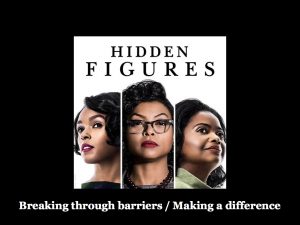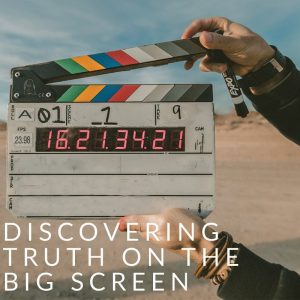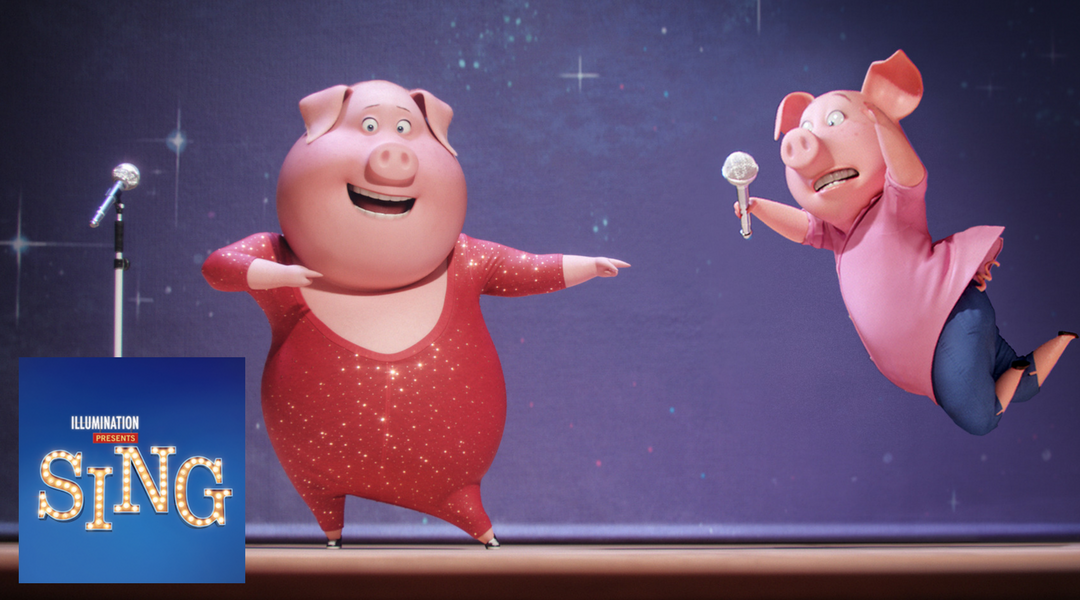by Jonathan Manafo | Jul 18, 2017 | Sunday Conversations
 I gotta say, if you’re a fan of Motown music, music with soul, Miles Davis/Chet Baker style jazz, and Pharrell Williams, you will absolutely love the music in this music. (had to get that in first)
I gotta say, if you’re a fan of Motown music, music with soul, Miles Davis/Chet Baker style jazz, and Pharrell Williams, you will absolutely love the music in this music. (had to get that in first)
This movie is set in the 60’s in Virginia. It’s about Nasa’s first and second mission into space. Some might watch it and focus on accomplishments of Nasa, and they wouldn’t be wrong, because of the historical characters in the movie also celebrated the accomplishments of Nasa and the journey into space that they were a part of. But this movie is about so much more than that.
Three woman: Mary, Dorothy, and Katherine. They all worked in the computing department of Nasa. That might confuse some of you. It wasn’t the IT department…they were the computers…doing math and figuring out equations…all for the purpose of getting spaceships into orbit. This was common in Nasa, but also earlier in places like Harvard and companies that served the purpose of WW2.
These woman are real people who served their country and communities in a season of the worst segregation we’ve seen.
Each woman had their forte:
- Dorthy was mechanically inclined and good with early computer programming
- Mary had an engineering mind
- Katherine was the true math wizard
They were all trailblazers of sorts…and all played such amazing roles in this story.
Dorthy worked her way into a supervisor role and became the first African American to become a supervisor at Nasa. Mary worked around a broken system to get her credentials to finally become an engineer. It didn’t come without hard work and lots of courage. Katherine was the only woman (and African American) in the launch team math room, and became the most important person in that team.
Each woman makes a difference. Each woman breaks boundaries. Each woman doesn’t let circumstances hold her back. Each woman doesn’t accept the limits society unjustly puts on her, instead push through to leave their mark and make their dent on society. (TRAILER)
What are the themes that really stood out to me? What parts of the story speak to truth?
One huge take home for me is right in the title. Hidden figures…those within the cracks…the un-usual suspects contribute as much to the story as those who are in the spot light.
In the public, who got all the attention and credit? The Astronaut. No one is knocking him for that either.
There’s an amazing scene where the Astronaut will not board the spacecraft unless he knows that the numbers, the math, the equations that assured launch and landing, was confirmed by Katherine. She’s a computer…in a math room…using chalk to draw and write…BUT he won’t board, with out her.
Something we can take from the narrative of scripture is this truth: You don’t have to be the leader, the point person, the singer, the speaker, in the lime light, on the stage, or in front to make a difference – YOU can be hidden and still change the world. You can be HIDDEN and still change your and others circumstances. This doesn’t excuse the injustice of those who think of themselves as better, but it does help those who may feel hidden or slighted to move forward anyways, with confidence.
So many come characters come to mind, but for this movie, I think Ruth may fit best.
The OT book of Ruth:
- it’s about a mother, Naomi, who lost her husband and sons to death.
- She’s left with two daughter in laws
- One of them, Ruth, insists on staying with her, even though Naomi wants her to return to her people.
- Ruth was not an Israelite. She was from Moab.
- Ruth worked hard in a Boaz’s field. She proved herself and was known as a woman of noble character.
- Boaz takes Ruth to be his wife. They have a son. Obed. Who who father’s a boy named Jesse, who father’s a boy named David, King David.
Fast forward to Matthew’s gospel. Ruth is found in the genealogy of Jesus. Another woman is found there – Rahab. Unlike Ruth, Rahab was a prostitute, like Ruth, she chose well and helped God’s people. Both of them are included as figures who become part of the grand story of salvation. Both could’ve easily been hidden from the records, one for being a Moabite, the other for being a prostitute. In the story of Jesus, even the hidden figures are recognized for their contribution.
Which leads us to our next take home…We all Play a Part…we all contribute…at least we all should.
Every single person in Nasa played a part in getting the first Astronaut into space – The Math team, the computers, the secretaries, everybody.
Why is it that in 2017 we still can’t figure out that every gift and skill we offer the world is a contribution to the greater whole?
If there’s any place that should understand this better, it’s the church. (Body theology / Body of Christ / Spiritual Gifts / We all play a part)
I’ve saved this for last. What an unfortunate reminder that our past, and our present is filled with discrimination, segregation, racism, injustice, etc. That said, this movie is also a beautiful reminder that we, as humans, are all the same. That we should love our neighbour as our self. That we must know deep in our hearts, that every one we meet eyes with matters to God, and therefore, matters to us.
(Watch these scenes: THIS & THIS)
This is of course the biggest take away from this film, that our past is stained by how people have been treated by other people. That we can’t seem to get past even the simplest of differences. That we can’t appreciate others for who they are and what they contribute to the world we live in. And finally, and thankfully, that there are courageous men and women who have stepped up to make a difference.
Two of my favourite parts of the movie are when Mr. Harrison (Kevin Costner) walks over to the small coffee pot and removes the label (coloured) on it, and then when he breaks down the sign to the coloured washroom and says, “at Nasa we all pee the same colour”.
Jesus came to remove the label(s)…
- the label of sin
- the label of doubt
- the label of fear
- the label that others put on us
God’s label for us is – CHILD & FRIEND
Jesus’ label for us is – ONE (we are community in him)
When are we going to stop putting labels on people? That’s not our job. Only God has that job. He does it well. Let him do it. If you’re going do it, then borrow from his practice and offer labels that encourage, and inspire and build up, not diminish, hurt or tear down.
If anyone should get this…it has to be the church. Our communion table levels the playing field…we are ONE in Jesus.
We are so thankful to woman like these who showed courage and dignity and brought us closer to a better understanding of what it means to be a human being who bears God’s image. In the same light, forgive those (perhaps us) who have been too stubborn and ignorant (and sinful) to see or live out the values of God’s kingdom by loving our neighbour as our self.
– – – – – – – – – – – – – – – –
There is so much more to say, but this post will not allow it. Hopefully we’ve spurred on some dialogue and questions for you to work through. Below are some other scriptures to read and work through.
Galatians 3:28 There is neither Jew nor Gentile, neither slave nor free, nor is there male and female, for you are all one in Christ Jesus.
Romans 2:11 For God does not show favoritism.
Galatians 2:6 As for those who were held in high esteem—whatever they were makes no difference to me; God does not show favoritism…
Ephesians 6:9 And masters, treat your slaves in the same way. Do not threaten them, since you know that he who is both their Master and yours is in heaven, and there is no favoritism with him.
James 2:1-9 My brothers and sisters, believers in our glorious Lord Jesus Christ must not show favoritism. Suppose a man comes into your meeting wearing a gold ring and fine clothes, and a poor man in filthy old clothes also comes in. If you show special attention to the man wearing fine clothes and say, “Here’s a good seat for you,” but say to the poor man, “You stand there” or “Sit on the floor by my feet,” have you not discriminated among yourselves and become judges with evil thoughts?
Listen, my dear brothers and sisters: Has not God chosen those who are poor in the eyes of the world to be rich in faith and to inherit the kingdom he promised those who love him? But you have dishonored the poor. Is it not the rich who are exploiting you? Are they not the ones who are dragging you into court? Are they not the ones who are blaspheming the noble name of him to whom you belong? If you really keep the royal law found in Scripture, “Love your neighbor as yourself,” you are doing right. But if you show favoritism, you sin and are convicted by the law as lawbreakers.
by Jonathan Manafo | Jul 12, 2017 | Sunday Conversations
 What if you could see the future? What if you knew what was coming in 5, 10, or 15 years? You knew the joy around the corner, but you also knew the pain that was waiting for you?
What if you could see the future? What if you knew what was coming in 5, 10, or 15 years? You knew the joy around the corner, but you also knew the pain that was waiting for you?
This is the gift Dr. Louise Banks was given. Unless of course you view it as a curse. To each there own I guess.
For the next 3 posts we will be using Movies as our context and seeing if we can discover truth on the Big Screen. Our first movie – Arrival.
To be honest, I’m not a SCi-Fi fan. I definitely don’t read sci-fi for fun. But this movie was drawing me in. I had heard many good things about it, and then a certain friend told me that I had no choice but to watch it. So…I did. It was pretty clear that it would make the cut for this series. There was so much going on in this script.
What is it about?
It starts with the main character, Louise, having what look to be flashbacks. The scene quickly changes to what the gist of this movie will be about, Aliens visiting planet earth. 12 different space ships with two Aliens in each of the ships have arrived.

Louise is a linguistics professor who is called on to learn and decipher the Alien’s language. She’s joined by a Physicist (Ian Donnelly). They are the only two people who really make any progress in understanding what these Aliens (Heptapods) were trying to communicate to the world. After much work and hours of looking at their written language, Louise and Ian have some major breakthroughs – they are beginning to understand each other.
While this is going on, Louise is having, what we think to be flashbacks, but what is becoming increasingly clear are actually visions of her future. These visions are so real, she is experiencing the future like it’s happening in the present. Her contact with the Heptapods have given her a gift to look into the future – more than that, to experience time like it’s all before her, no past or future.
The US army, who is organizing all this work and mission, are tempted to do what governments normally do, blow things up. It seems like violence is always the first response in any tense situation. This is the case here as well. However, with the help of Louise and Ian, the governments of the world avoid a war against these Aliens, who are in the end, peaceful.
Arrival is essentially a Sci-Fi movie about a linguistic professor who defies the government, while passionately and skilfully working to understand this Alien presence…always working on the basis that you can’t come to any full conclusions about your enemies and those who are different than you are, without fully seeing them for who they are and what they are actually trying to communicate.
When you come to think about it, this idea and method could work well in any area of conflict resolution.
What are the themes that really stood out to me? What parts of the story speak to truth?
Language…
Ian quotes Louise in their first conversation, “Language is the foundation of any civilization…it’s the glue that holds people together. It is the first weapon drawn in any conflict”
In their first crack at the problem, Ian throws his scientific approach into the ring. Louise responds with, “How about we talk to them before throwing math problems at them.
 What drew me most to this story was Louise’s undeterred drive to ‘UNDERSTAND’
What drew me most to this story was Louise’s undeterred drive to ‘UNDERSTAND’
– how can one ever make a conclusive decision on someone else until they really understand who they are and what they’re attempting to say.
– Language is so key in conflict resolution
We are often tempted to understand something quickly without really understanding something fully.
A theme that has resonated with me, when it comes to understanding and working through our human differences, while at the same time trying to convey the good news, are found in these two words, GENTLENESS & RESPECT. (1 Peter 3:15) As people who follow Jesus, we have got to be the better person, the one who actually attempts to understand where our neighbour is coming from, who they are, why they may act in the way they do. Maybe that’s why this part of the story impacted me so much.
Also worth noting: The comparison of Genesis 11 & Acts 2. In Genesis 11, different languages confused and divided people, in Acts 2, with the Spirit’s empowerment, languages actually brought people together. The good news was to be shared with all people and all languages.
Response & Reaction to conflict or differences…
Why is it that so often our first response to conflict is violence.
“He pulls a knife, you pull a gun. He sends one of your guys to the hospital, you send one of his to the morgue.“ (Untouchables, Jimmy Malone & Elliot Ness)
This theme seems to to come around a lot doesn’t it? Why can’t peace be our first option?
As a follower of Jesus, I want to do my best to be a Peace Maker…a person of peace. The argument is always, what if this happens, and what about this scenario, but can’t we at least be people who think PEACE first, not SHOOT first?
(movie quote) “If all I ever gave you was a hammer??? Then everything is a nail.”
Louise, in one of the final scenes, goes into the Alien ship, to be in close proximity with the Aliens. Here’s the thing: We often try and fix problems and conflicts from the outside, shoot from far away, attack from the outside, instead of taking a step closer and fully understanding our differences before discerning what the next steps are.
Matthew 5:9 Blessed are the…PEACE MAKERS…
Ephesians 2:14-15 For he himself is our peace, who has made the two groups one and has destroyed the barrier, the dividing wall of hostility, by setting aside in his flesh the law with its commands and regulations. His purpose was to create in himself one new humanity out of the two, thus making peace…
What if you could see the future?
Here’s the wildest theme of this movie. If you could see the future, if you could see the JOY and the PAIN, would you still walk into it knowing that Joy & Pain will go hand in hand?
- Would you say NO to the potential joy, because you want to avoid the pain?
- Would you say NO to love because you want to avoid the struggle.
Louise has to make a choice. She can continue to walk into her future, knowing full well what it will be, or she can walk another direction and avoid the hurt she sees on the horizon. If she does, she’ll also miss out on the Joy. The indication is that she embraces the future, JOY & PAIN.
But what would you do?
Here’s where the gospel story might connect the most. Who is one person who knew how things would turn out, knew the pain that came with his mission, knew the struggle that he’d face in the future, but still chose love and relationship and community?
God the Father & Jesus the Son.
God knew that Jesus would suffer…and he knew that humans would disappoint, but he chooses to experience it anyway.
Costello, one of the two aliens in the ship, who had the gift of foreknowledge and seeing the future was injured and eventually dies. Even though he knew his future, knowing the pain and struggle awaiting him on earth, he comes anyways, to help, to save – sounds a little (or a lot) like Jesus.
God makes his choice. He chooses me. He chooses you.
He comes, through Jesus, and speaks our language.
He comes, through Jesus, to reconcile us to him (not push us further away).
If nothing else about this movie moves you, I hope these final words do.
Arrival is a fictional story, about aliens and humans, about conflict and peace, about language and understanding, about love and pain. How much can you take away from a story like this?
Next time you’re in a theatre or watching a movie on TV, look a little deeper, who knows what you’ll stumble on.
– – – – – – – – – – – – – –
On tap for next week – HIDDEN FIGURES





 What if you could see the future? What if you knew what was coming in 5, 10, or 15 years? You knew the joy around the corner, but you also knew the pain that was waiting for you?
What if you could see the future? What if you knew what was coming in 5, 10, or 15 years? You knew the joy around the corner, but you also knew the pain that was waiting for you?
 What drew me most to this story was Louise’s undeterred drive to ‘UNDERSTAND’
What drew me most to this story was Louise’s undeterred drive to ‘UNDERSTAND’